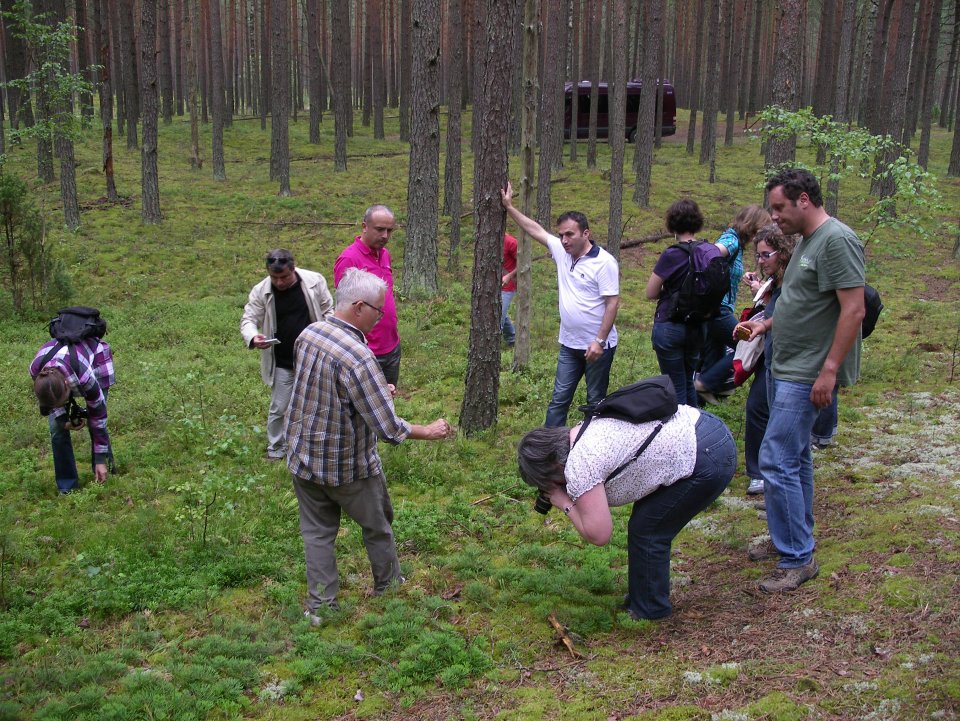
The objective of the project PLANT WILD-Forest Plant Wild Harvesting Learning in Europe(2011-2013) was to promote the employment opportunities in rural and mountainous areas and sustainable wild harvesting techniques, generating best training practices to obtain environmental and economical sustainability and determining tools to support trainers, learners and professionals. Partipating partners developed the necessary methodologies for implementing an effective training on Wild Collection (WC) of Non Wood Forests Products (NWFP), focusing in Medicinal and Aromatic Plants (MAPs).
NWFP are an important but sometimes forgotten income from rural and mountain areas of Europe, being necessary to find sustainable economic opportunities, to preserve the population, the natural heritage, the biodiversity and the natural resources. Nowadays, wild MAPs are still needed to provide raw material to medicinal, cosmetic and perfumery industry. Anyway, WC activity has to be done properly, following good practices and focusing sustainable business in order to fix the social success. So, training on these topics is very important and tools have to be implemented properly.
Participating countries (Lithania, Portugal, Spain and Turkey) discussed different topics for sharing the state of art and the challenges for implementing training of MAPs:
a. Research, technology transfer and training for adults in NWFP;
b. Sustainable WC;
c. Businesses of WC;
d. Good practices for training WC.
Partners wrote several reports with conclusions of the subjects discussed and proposed six training modules for MAPs collectors:
1. Basics of plant science with emphasis on MAPs.
2. Knowledge of MAPs species.
3. Harvesting of raw materials and use.
4. Sustainable WC: methodology, legislation and control.
5. Post-harvest processing of MAPs.
6. Marketing and business.
New collectors doing WC of MAPs have low information in botanical identification and habitats knowledge, so to avoid risks of mistakes they need training. In addition, using good practices, supported by laws, ensures the long-term survival of natural resources. Hence, professional collectors should receive regular training for assuring their sustainability, as well as forest technicians to implement the control of the activity.
WC entrepreneurs need updated market information for required products. Moreover, industries should know which varieties have the major active compounds' content. Then, collectors should know the best time to harvest and good harvesting and processing practices focusing the procurement of high quality raw material.
Lack of available data on ecology, distribution and conservation status of species, feasibility of WC techniques and economic studies on WC activity, difficult the implementation of high technical training. In addition, experienced collectors are decreasing, as they are getting older, so traditional knowledge is disappearing with them.
Moreover, it is difficult to reach people dealing with WC, as it is a black economy, and it is hard to convince existing professional collectors to receive training on sustainable WC as these techniques are not profitable in a short term.
The rising public interest in collecting and usage of MAPs leads to the need to develop the best training model that provides diverse knowledge on sustainable WC and usage of MAPs.
Knowledge of plant biology, ecology, botanical identification, bioactive compounds and storage patterns, theoretical and practical skills on plant harvesting and post-harvesting technologies, knowledge of market and business framework, as well as knowledge on legal acts and legislative measures regulating wild plant collection, are essential for professional collection and sustainable usage of MAPs resources.
Eva Moré i Palos, eva.more@ctfc.cat, www.ctfc.cat
Further information
2011-2013. GRUNDTVIG PLANT WILD - Forest Plant Wild Harvesting Learning in Europe. Lifelong Learning Program. https://plantwild.wordpress.com/
E. Moré, R.Melero, A.M.Barata, V.Lopes, F.Rocha, J.Radusiene, B.Karpaviene, H.Cetinkaya, N.Sekeroglu, Muhittin Kulak. Project report Forest Plants Wild Harvesting Learning in Europe. PLANT WILD PROJECT Grundtvig Learnership Association. https://plantwild.files.wordpress.com/2013/07/report-conclusions-grundtvig-plant-wild.pdf
2011-2013. GRUNDTVIG PLANT WILD - Forest Plant Wild Harvesting Learning in Europe. Lifelong Learning Program. https://plantwild.wordpress.com/
E. Moré, R.Melero, A.M.Barata, V.Lopes, F.Rocha, J.Radusiene, B.Karpaviene, H.Cetinkaya, N.Sekeroglu, Muhittin Kulak. Informe del Proyecto Aprendizaje sobre recolección Silvestre de plantas forestales en Europa. Asociación de aprendizaje Grundtvig, proyecto PLANT WILD. https://plantwild.files.wordpress.com/2013/07/report-conclusions-grundtvig-plant-wild-espanol.pdf
Activities performed during "Grundtvig Plant Wild" Project
Collection training
